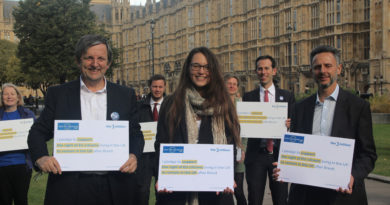How a Facebook group is “removing bargaining chips from the Brexit table”
Hidden in the Facebook jungle, there is a group that helps EU nationals in the United Kingdom get permanent residence and become British citizens. It is one of the many initiatives emerged after the EU referendum to support people affected by the UK decision to leave the European Union.
After the vote, a rush to passports and residence documents began for both EU nationals in the UK and British residents in the EU, as people want to secure their rights in their country of residence. But submitting the documents and filling the forms is not always easy, especially if over the years people have been in and out of work.
The Facebook group UKCEN (UK Citizenship for European Nationals) was therefore created to support those struggling through the process. People can post questions and get answers from certified immigration lawyers, for free. Started as an information forum, from the beginning of the year UKCEN has helped 1,196 people obtain the permanent residence card and 354 become British citizens. Although it is set as private, the group has now more than 17,000 members. Its motto is “removing bargaining chips from the table,” because once naturalised, people will be able to maintain their rights in the UK no matter what happens with Brexit.
The person behind this initiative is Claudia Borgognoni Holmes, a British-Italian. Claudia arrived in the UK in 1998 to learn English in order to get a tour management certification in Rome. But once in Italy, she decided to move back to London: “I liked it too much here,” she says. After a few years working as tour manager in the UK and across Europe, she was encouraged by the mum of a friend to take a course in sign language. She fell in love with the profession and became a sign language interpreter. She also took British citizenship, before marrying a Brit. Today she splits her time between her job, the family and managing UKCEN.
What motivated you to set up the Facebook group?
I got the idea immediately after the referendum because some 3 million people [EU nationals in the UK] had not been able to vote. The reason why I set up the group in the first place was to promote citizenship. It is important to become a citizen in the place where you have lived large part of your life and to fully participate in the public life of that country. Citizenship is the only way to do it. All people are citizens where they live, but they can only vote if they naturalise.
How did you start the group?
After the referendum I saw that many people were searching information online on the naturalisation process. So I began collecting resources and making them available via the Facebook group. Then I came across another group of EU citizens, also born after the referendum, and noticed that lawyers were commenting on posts. I contacted them to ask if I could share some of their resources, and this was the start of an incredible collaboration. Three lawyers began volunteering advice to group members. Of course a lot of people were also applying for permanent residence (a pre-requisite for citizenship), so we just started helping them. The process is straight forward if you have 5 years of work, but it becomes complicated if you have had breaks and you might need more evidence if you have been self-employed. We created a document to explain these different scenarios, while lawyers responded to more specific questions in the group. This approach has proven to be very successful.
There has been a rush to permanent residence cards in the past year, but about 28% of applications were rejected by the Home Office. What is the success rate of your group and why do you think so many applications failed?
So far we haven’t had unsuccessful applications among people in the group. Of course you have to be eligible to apply, but if you are eligible and follow the guidance you are very likely to succeed. The problem is that in the rush, many people who were not eligible applied anyway and many who were eligible did not provide the evidence they were supposed to. This is also because the guidance is not completely clear or consistent. The online form can confuse people. One of the questions, for example, asks if you have ever been a student in the UK and people who have studied here might reply positively, but the form only refers to the 5-year period for which you are claiming residence. This leads to mistakes. That’s where the group can help. We have put together resources that explain these flaws. In recent months we have also seen improvements in how the Home Office responds to inconsistencies. Before there was just a rejection, now they contact applicants and ask for clarifications or further evidence.
What about people who are not eligible for permanent residence?
Certain categories who cannot apply for permanent residence will be able to apply for the “settled status” that the government is planning for Brexit. One of the key barriers, the requirement of comprehensive sickness insurance for the economically inactive, will be removed. This will resolve a lot of issues, especially for people who are in the UK because they are married to British citizens. Unfortunately, there are still many things to clarify within the settled status, for example the situation of people who are taking care of a disabled person or another family member and never had formal employment. We are trying to collect cases and contribute to the discussion on how to improve the proposed ‘settled status’.
What is your general assessment of the “settled status”?
It appears that the UK and the EU agree that the basis of ‘settled status’ should be 5 years of residence rights without comprehensive sickness insurance, but beyond this the details are not clear. It is difficult to predict if all situations have been considered. In general, I think there could be a much lighter approach. The UK would benefit because processing 3 million applications, or even half of them, on the basis of 5 years of documented residence will be very hard. It has been suggested a new system will be put in place and it will take 2 weeks to process applications, but this will depend on the type of documents required. Until we know more, it is just speculations. The problem is that what is said publicly and what is written in the technical notes negotiated in Brussels is different, so at the moment there is confusion and people are concerned.
Which moments have marked the history of UKCEN?
The key moment has been when lawyers started to volunteer. At the beginning they were 3, now they are 8, plus there are 19 administrators. Last year we also started a petition on the parliament website to create awareness about the flaws of the permanent residence system. Another milestone was the creation of an interactive FAQ document that made it easier and faster for people to access information. Generally speaking, the most amazing thing was to see this collective display of generosity and everyone really driven in helping people getting citizenship. I never really experienced anything like that before. I may have started the group, but it is really the commitment of the volunteers and the lawyers that make it work.
Do you receive funding or do you work on a volunteer basis?
We are all volunteers. We fundraise for the Joint Council for the Welfare of Immigrants and they support us by offering our admins and lawyers discounted courses on immigration law. We want volunteers to expand their knowledge, as knowledge is the basis of all this.
For many people taking citizenship is a major decision that affects identity. In the current context, many see it as somewhat being forced into something unnecessary. What are your views?
This is a completely personal choice. At the moment there is a lot of resentment, amplified by social media and the press. It is like everyone in Britain is racist and wants immigrants out, which is not true. I still believe the xenophobes are a small group of people. If anything, half voted to remain in the EU, the 3 million EU nationals didn’t get the chance to vote, and many voted leave for completely different reasons. But this is the rhetoric that has taken centre stage in the media. What is interesting is that people who have been living in the UK for 10 years or more are already citizens. They act and live as citizens of the country, but what is missing is they cannot vote. In a way it is a shame that a moral issue like citizenship is discussed so much about only in the context of Brexit. I was proud when I too British citizenship because I felt I belonged here, I was living here and was planning to stay. But this is very personal and everyone has perceptions and feelings which have to be respected.
Claudia Delpero © all rights reserved.
Photo via Pixabay.






